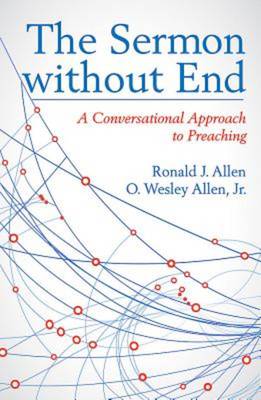
- Afhalen na 1 uur in een winkel met voorraad
- Gratis thuislevering in België vanaf € 30
- Ruim aanbod met 7 miljoen producten
- Afhalen na 1 uur in een winkel met voorraad
- Gratis thuislevering in België vanaf € 30
- Ruim aanbod met 7 miljoen producten
Zoeken
The Sermon Without End
A Conversational Approach to Preaching
Ronald J Allen, O Wesley Allen
Paperback | Engels
€ 41,95
+ 83 punten
Omschrijving
A New Model for Post-Apologetic Preaching in a Pluralistic World. The relationship between preaching and the public sphere has long been debated. Three different theological approaches tend to dominate the discussion. In different ways, these approaches take into account the movement from the modern mindset of the mid-to-late 20th century to the emerging postmodern worldview. In The Sermon without End, authors Allen & Allen thoughtfully offer a fourth option, one that in their view has not received much attention, but which offers a distinct and especially helpful perspective. It is a new and dynamic conversational model, reaching beyond the earlier work of Tillich and Tracy. In this homiletical framework, conversation takes place in multiple directions between the text or tradition and the world today. It is preaching in conversation, not just toward but with voices from the public sphere. The book provides a solid foundation for understanding this post-apologetic approach, but it importantly goes on to offer practical, real-pulpit guidance for implementation in a preaching ministry. It is a book for both scholars and practicing preachers who wish to reach people in meaningful and significant ways, and in ways that make sense for today. "This book deserves to be widely applauded. It provides a post-apologetic lens to illuminate the history of various modern homiletical discourses even as it envisions a postmodern one. ... I strongly recommend this book for homileticians, preachers, and lay people alike." - Duse Lee, Boston University School of Theology - Reviewed in Homiletic
Specificaties
Betrokkenen
- Auteur(s):
- Uitgeverij:
Inhoud
- Aantal bladzijden:
- 176
- Taal:
- Engels
Eigenschappen
- Productcode (EAN):
- 9781630883218
- Verschijningsdatum:
- 20/10/2015
- Uitvoering:
- Paperback
- Formaat:
- Trade paperback (VS)
- Afmetingen:
- 150 mm x 226 mm
- Gewicht:
- 226 g

Alleen bij Standaard Boekhandel
+ 83 punten op je klantenkaart van Standaard Boekhandel
Beoordelingen
We publiceren alleen reviews die voldoen aan de voorwaarden voor reviews. Bekijk onze voorwaarden voor reviews.











